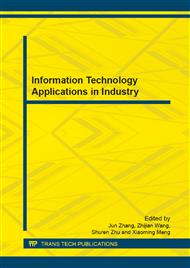p.3100
p.3104
p.3108
p.3114
p.3120
p.3125
p.3130
p.3135
p.3141
Reconfigurable Aggregated Multicast Scheme Based on QoS Categories and Tree Similarity
Abstract:
Traditional IP multicast had poor scalability. Larger the number of groups was, more forwarding states were stored, which meant more memory overhead and slower forwarding process. To solve the problem, a reconfigurable aggregated multicast scheme was proposed. This scheme provided a unified service for multiple multicast groups based on QoS categories and tree similarity. It could also be reconfigured with QoS requirements and multicast groups change. Results show that the scheme can achieve more forwarding state reduction compared with conventional aggregated scheme under certain bandwidth waste threshold or the number of groups.
Info:
Periodical:
Pages:
3120-3124
Citation:
Online since:
December 2012
Authors:
Price:
Сopyright:
© 2013 Trans Tech Publications Ltd. All Rights Reserved
Share:
Citation:


